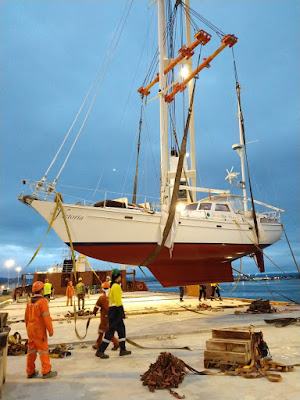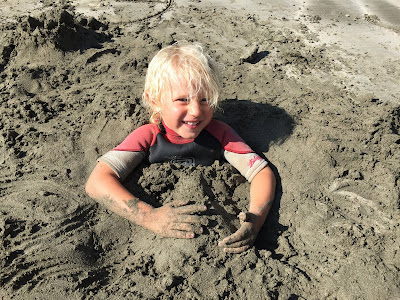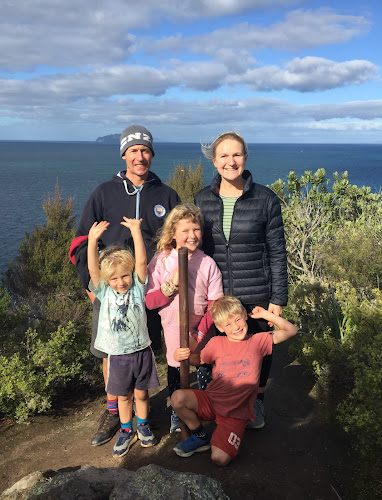George's first fish
 |
| Heading ashore in the dinghy in Oneroa Bay, Waiheke Island |
Brow furrowed over my supplies spreadsheet, I pause to ask Angus if he thinks that 12 sheets of loo paper per person per day will be about right. He sighs and tells me I have asked this loads of times; he doesn’t know, but surely I must know the answer by now. I don’t, but let’s be honest, I’m sure they sell loo roll in the South Pacific Islands, so it’s no big drama if we need to re-stock. I’m not so sure they’ll have 1kg bags of powdered milk, each of which makes 8 litres, or 1l vats of factor 50 suncream, so those calculations are perhaps more crucial. We are in the process of “stocking up” for six months in “the Islands” as they are affectionately known here; Tonga, Fiji, Vanuatu and New Caledonia. Obviously, we will be close to land for much of that time, and we can visit the big islands for supplies, but many of the small islands don’t have any people, let alone shops, so it’ll be easier if we take most of our dry goods with us.
 |
| Washing the decks! |
Eloise and I have drawn up a weekly menu to try and make the purchasing as straightforward as possible. So all we need to do, for example, is decide how much porridge we usually eat for breakfast, and multiply this by the number of times we’ll eat porridge in six months. What could possibly go wrong? Eloise has attempted this calculation for marshmallows, and Angus for beer, and both were completely stumped by the number of unknown variables which might affect our consumption rate – guests, parties, unexpected beach bonfires – and after lengthy deliberations they both failed to reach an answer at all. Meanwhile, I am tasked with deciding the quantities for every single other consumable item on board.
 |
| Easter breakfast - note enormous easter eggs on the bookshelf |
New Zealand is not quite as far ahead as the UK with online grocery ordering, but fortunately they have recently introduced Click and Collect at Pak’n’Save, which is handy, as it’s one of the best places to buy food in bulk quantities. It’s quite fun going to collect the orders, as it’s all packed neatly into huge lockers, and you simply punch in your pin number, and turn the lock to retrieve the goods – 12 bottles of tabasco for Angus yesterday (one every two weeks!), amongst many other things.. I tested the staff at the Pak’n’Save meat counter with my request for large amounts of specific quantities of vacuum packed meat, and they were absolutely amazing. I’m not sure if a supermarket in the UK would do the same for a customer with so little fuss. They are making up twenty individual packs each of chicken, mince, and sausages for us, using as little plastic packaging as possible, and freezing the whole lot, plus lots of cheese and salami, ready for our boat freezer. They didn’t take any payment when I ordered it all, just saying, “No problem, just pop in anytime on Friday and it’ll all be ready for you.”
 |
| Jack being his usual crazy self.. |
This amazing “no problem” attitude is not quite what we are experiencing with UK boat-related bureaucracy. As I write, Angus is wading through a murky swamp of rules and red-tape to try and get Victoria named and registered as a UK vessel; this is essential for us to be able to sail her to other countries. The first email we received was entitled “Vitorica”, luckily a typo, but it was a sign of the farce which followed. Victoria was previously New Zealand registered, and she was built here 30 years ago by her original owner. This causes problem number one; there is no certificate of build, and no original bill of sale, as her builder and owner were one and the same, and she has not changed hands until now. We can probably get around this, but the second issue is that the UK Registry will not accept her New Zealand certificate of tonnage, and are asking for a UK recognised surveyor to do a new one. Who knows how much this might cost and if it is even feasible in the timescale we have before we plan to leave for Tonga. Generally, a boat is required to be lifted out of the water for a survey – we only just did this for our pre-purchase survey, and then again for all the painting, and we really do not want to have to do it again…! We won’t be able to progress it tomorrow as it’s ANZAC day, which is another public holiday here. Nightmare. I’m sure there will be a solution, and Angus will find it for us. Hopefully we will find a kind person who feels they have sufficient authority in their job to make a little exception to help us.
 |
| Hunting for easter eggs in the boys' cabin |
On the subject of registration, yesterday Angus registered our
EPIRB (Emergency Position Indicating Radio Beacon). An EPIRB is a bit of safety kit that almost every
boat going offshore carries these days.
If activated, either manually or by finding itself floating in the sea, it
sends a distress signal back to Falmouth.
Recently, there has also been a surge in personal EPIRBs, which can be fitted
into a lifejacket and are activated in a man overboard situation. (We have something similar but slightly
different to this.) Having submitted the
registration form online, the email that popped into Angus’ inbox by return
read, “Due to unprecedented demand for EPIRB registrations, it may take up to ten
weeks to process your application.” Obviously,
this would be laughably useless for us, given that our planned departure date from
New Zealand is in about four weeks.
Luckily, Angus got hold of a sensible “no-problem” kind of person on the
phone, who verified our EPIRB registration there and then, so whether “Vitorica”
ends up being UK registered or not, if the ship goes down, Falmouth will get
the call! (followed shortly by Eddie and
Will – just to warn you both..)
 |
| A sunset hill climb on with the boys on Waiheke |
Anyway, that is probably more detail than you need about grocery
shopping and registration admin. I’m
sure it is more interesting to hear about where we have been, what we have
seen, the new skills and pastimes of the crew and of course, how my next micro-switch
fix went on the fresh water pump pressure valve. I’ll start with the bad news – the micro-switch.
I found a brand new one, trimmed off an
overly long metal part, fitted it into the pressure switch, turned the power on
again – and, as had happened on the previous two occasions, it didn’t work at
all. No noise, no water pumping, absolutely
completely useless. So, for the third
time, I put back the old, temperamental micro-switch, only to find that even
this one had now given up the ghost. By
this stage, to get water out of the tap, we had to pull a wire connector off
one terminal and touch it against another, and then the pump went like the
clappers (but wouldn’t stop!). I was all
ready to head to the chandlery for a brand-new pressure switch, or even go
crazy and buy a modern water pump with one inbuilt. For $300 NZD, I thought to myself, we could knock
this little irritation on the head once and for all. But then Angus and I discussed it and we
realised that Jim has designed the water system to run at low pressure (approx.
12 psi), to minimise water use. Modern water
pumps operate at much higher pressures (30-50 psi), and to install one of these
would cause us all kinds of problems that we don’t really have time for. Amazingly by the next morning, the mind-of-its-own
micro-switch was working well again most of the time, and as Eloise and George
are also now very adept at “giving it a tap”, the search for a more reliable permanent
solution seems to slip a little further down our jobs list each day.
 |
| Easter egg hunt on deck |
We went sailing for four days over Easter, along with pretty
much every New Zealander who owns a boat, but the vast number of large
anchorages in the surrounding islands absorbed everyone with no problem at
all. We spent our time on Waiheke Island, which we loved. On Good Friday, we were one of
about 150 boats in Oneroa Bay, where we have some friends, Tim and Ginny. When we called them, with no prior warning, to say “Hi, we’ve just anchored
in your bay!”, they very hospitably invited us all for a delicious supper, to share the snapper
they had caught that afternoon. The days
are very short here now; it’s pitch dark by 6pm, so we armed ourselves with
headtorches for our return dinghy trip.
 |
| Oneroa Bay as the full moon was rising |
But as it happened, it was a full moon and the clearest night
imaginable, so before we returned to Victoria, the
children had a magical moonlit play on the beach. They found a rope swing and some lovely soft
sand, bathed in the light of the moon, and it was almost impossible to drag
them away from it. Eventually we had to;
Jack and George are becoming increasingly mad at bedtime, and the later we leave
it the worse it gets. We have had to introduce
a football-inspired card system for particularly wild behaviour. Green card is the first warning, yellow card
is getting serious, and a red card means no bedtime story, which causes a lot
of sadness. I honestly have no idea how
we will manage ten days at sea with these crazy, energetic boys. The only thing to hope for is a bit of a rolly
motion – that will definitely quieten them down, at least for the first couple
of days until they stop feeling sick.
 |
| Jack on the boat swing |
Eloise, on the other hand, is becoming a really useful crew, both above and below deck. She is head Anchor Chain Washer – a demanding job in some of these muddy anchorages, and has a repertoire of several dishes in the galley. Her specialities are chicken noodles, custard, honey popcorn and nutella on bread. Admittedly none of those contain a single one of our five-a-day, but they all go down very well with the junior crew when they’ve burned off one meal before I’ve even thought about the next. She has also taught George and Jack in a couple of new pastimes this week; playing in the mainsail cover, and hoisting each other up the mast. The mast bit isn’t as dangerous as it sounds, don’t worry. We have a kids’ climbing harness, and a “handy-billy”, where the rope goes back and forth through four pulleys, giving an 8:1 ratio. This means the children can easily raise themselves and each other a couple of metres by pulling on the rope, which they absolutely love. They also have a swing rigged up below the boom; definitely Jack’s favourite.
 |
| Playing in the mainsail cover |
George has taken the role of Victoria’s chief
fisherman. He was already very keen,
catching shrimp and mini jellyfish in the marina with his tiny little net at
every possible opportunity, but over the Easter weekend he got the taste of
bigger things. Our friend Tim very
kindly set us up with a trolling line on the back of the boat, and George had the
green rubbery squid-like lure in the water at every possible subsequent opportunity. He lowered it down when we anchored in Man O’
War Bay, Waiheke Island, and left it there while we headed ashore. Whilst we brushed up on our history - reading
about how Captain Cook and the British Navy not only anchored where we were to
take water from the spring ashore, but also helped themselves over subsequent
years to as many Kauri trees as they fancied to make masts and spars for their
ships - the fishing lure was working its magic.
Fisherman George went straight to his reel as soon as we
were back on Victoria. “It’s so heavy, I
can’t even pull it up. I’ve caught something
huge!” he cried, looking like he might burst with excitement. I lent him a bit of muscle power, and sure
enough, he had caught something very big indeed – a long piece of old rope – heavy,
muddy and extremely stinky. We were bagging
it to get rid of it, when George spotted an eleven legged starfish clinging to
it, which he placed proudly in a bucket to inspect more closely. While George admired his catch, Angus and I
up-anchored, and the second we were underway, the green lure was back in the
water. George didn’t take his eye off
it, and about twenty minutes later our dinner was firmly hooked. It was a kawahai – one of the most common
fish in New Zealand waters – sort of the equivalent of catching a mackerel in the
Solent, only much bigger. We filleted it,
dipped it in egg and breadcrumbs, and had a happy and delicious supper back in
the marina, while the rain lashed down outside.
 |
| It's fair to say that George was very excited to catch his first Kawahai |
One day seems to rush into the next as we approach the final
week before we begin our journey north. We
are aiming to have all the kit, spares and supplies we think we could need
before we leave Gulf Harbour, and then spend a week or so exploring the Bay of Islands,
including a night sail or two as we head to Opua. We have joined the Pacific Islands Rally, and
we will meet all those taking part in Opua Marina, 100 miles north of here, on
13th May. The pre-departure
week has a busy schedule with talks about weather, routing, bread-making, sea
survival, stand up paddleboarding and fishing, and equally importantly there is
children’s hour every day; an opportunity for the 25 children taking part to
get to know each other. Although our
three are mostly enjoying playing with each other, they are fighting quite a bit
too, and are definitely missing having their own friends; it will be great to
see them form some new bonds over the next six months. Our earliest planned departure date from Opua
is 20th May, but this is entirely weather dependent, and it may well
be later than that. The crossing to
Tonga should take us around 10 days. I
can’t really imagine 10 days without being able to “run the boys”; we might have
to set up some kind of gym in the aft cabin!
I’ll sign off now, until next time. We
have a busy morning planned tomorrow, including a possible SUP (stand up paddleboard)
purchase, a vast amount of food to pick up from Pak’n’Save, and a visit to the
chart shop. Luckily after that we have
friends coming for lunch and the afternoon, so it’s a good excuse to down-tools
and leave the rest of the boat jobs until the evening.
Love to all at home,
from the crew of the Good Ship Vicky! X
Fairway Bay Marina, Gulf Harbour, Whangaparaoa, New Zealand
(North Island)



Comments
Post a Comment